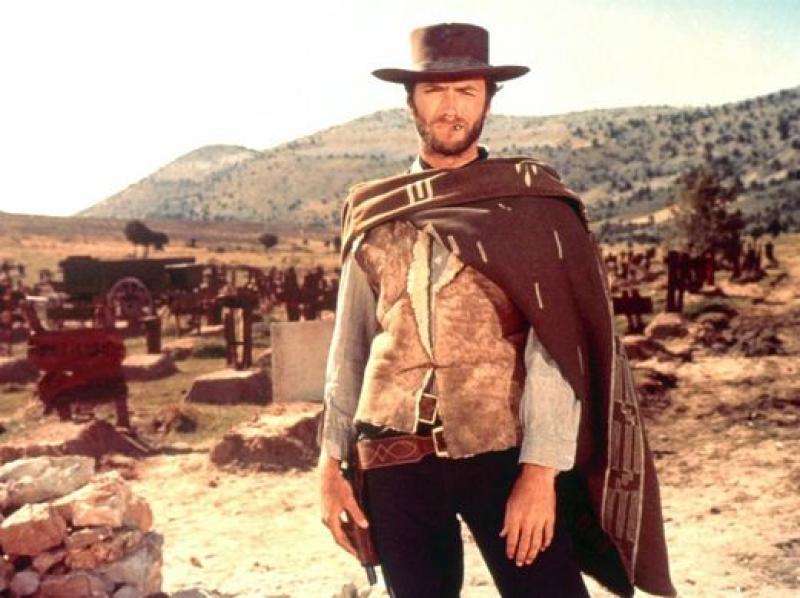What Is a Spaghetti Western?

What Is a Spaghetti Western?
How Westerns from Italy became the cinema gold standard

United Artists
By Christopher McKittrick, ThoughtCo, Updated November 10 2018
Italian-made Western films from the 1960s and 1970s are called "Spaghetti Westerns." Their stark depictions of the Old West have made them some of the most popular Westerns ever created.
As a genre, Westerns were incredibly popular with movie audiences from the earliest days of cinema—one of the first big movie milestones was 1903’s The Great Train Robbery—through the end of the 1960s. Westerns were also very popular on television in the 1950s and 1960s. In addition to the box office popularity of the genre, the relatively cheap production values of Westerns in which props and sets could be reused made Hollywood studios of all sizes embrace the genre.
international filmmakers who lacked Hollywood’s big budgets embraced the Western as a genre that could allow them to produce high-quality movies on limited budgets. The country outside of America that truly made the Western its own was Italy, whose Westerns of the 1960s and 1970s have been dubbed "Spaghetti Westerns."
The Origins of the Spaghetti Western
Prior to the popularity of Westerns, the most popular film genre in Italy in the late 1950s and early 1960s were "sword-and-sandal" films: biblical, mythological, and historical epics. In order to increase the international appeal of these epics, Italian filmmakers would hire American actors to star in the films, such as bodybuilder/actor Steve Reeves, who played Hercules in two Italian movies.
Italian filmmaker Sergio Leone directed Reeves in the sword-and-sandal epic The Last Days of Pompeii (1959) and followed it up with a similar film, The Colossus of Rhodes (1961). Next, Leone turned his attention to a different genre: the Western.
The success of Leone’s 1964 Western A Fistful of Dollars led to an explosion of popularity in Italian-made Westerns. Though it was not the first Italian Western, A Fistful of Dollars was the first to become a huge financial success around the world. Several factors contributed to its success: it featured stunning direction by Leone, memorable cinematography by Massimo Dallamano, a classic minimalist score by Ennio Morricone, and, perhaps most notably, a story ripped off from Akira Kurosawa’s 1961 samurai film Yojimbo. (The production company behind Yojimbo, Toho, received an out of court settlement after suing Leone for the unauthorized remake.)
However, perhaps the biggest reason for the film's popularity was the fact that it starred American actor Clint Eastwood.
Clint Eastwood and Spaghetti Westerns
At the time of his casting in A Fistful of Dollars, Clint Eastwood was already known as a Western star thanks to his role in the U.S. series Rawhide. In A Fistful of Dollars, Eastwood plays an unnamed character (popularly known to cinema fans as "The Man with No Name") who rides into a town controlled by two warring factions. The Man with No Name takes advantage of the greed of the factions by playing against both sides in a clever (and bloody) scheme.
A Fistful of Dollars quickly became the highest-grossing Italian film of all time, and Italian filmmakers now had a winning cinematic formula to follow.
After A Fistful of Dollars, Leone created two more Westerns with Eastwood’s unnamed character — For a Few Dollars More (1965) and The Good, The Bad, and The Ugly (1966) — as well as 1968’s Once Upon a Time in the West, which starred Charles Bronson. These four Leone Spaghetti Westerns are considered by critics to be among the greatest Westerns ever made, with The Good, The Bad, and The Ugly ranked as one of the Top 10 films of all time by IMDb users.
Characteristics of Spaghetti Westerns
One aspect that set Italian Westerns apart was their stark depiction of the Old West. Unlike the American westerns of this era, which were generally family-friendly entertainment starring “white hat” hero cowboys, the Italian Westerns embraced the harshness of the Old West. They also pushed beyond American standards of violence, featuring characters who possessed both heroic and villainous traits.
As with the earlier sword-and-sandal epics, Italian directors often hired one or two familiar American actors to boost the film’s international appeal. In addition to Eastwood, American actors who starred in Spaghetti Westerns include Richard Harrison (Gunfight at Red Sands), Gordon Scott (The Tramplers), Cameron Mitchell (Minnesota Clay), Mark Damon (Johnny Yuma), Burt Reynolds (Navajo Joe), and Henry Fonda (Once Upon a Time in the West).
Unlike American Westerns where Native Americans were frequent antagonists, Native Americans were rarely depicted at all in Spaghetti Westerns. In a few in which Native Americans do appear (such as Navajo Joe), they are usually not the film's antagonists.
Many Italian Westerns were actually shot in Spain (though some were also shot in Southern Italy) to depict the dry climate of the American Southwest. Old West sets from several Spaghetti Westerns later became tourist attractions in Spain.
The growing popularity of Italian-made Westerns led to the creation of the term “Spaghetti Western" (journalist Alfonso Sancha is credited with inventing the phrase). Many contemporary American critics used the Spaghetti Western label to deride the quality of Italian Westerns, as they had done before with Italian sword-and-sandal movies.
Most Spaghetti Westerns did not receive critical acclaim in their time because of repetitive plots, relatively low production values, and poorly dubbed dialogue. But in the decades since, many critics have come to appreciate the raw, stylistic filmmaking that produced Spaghetti Westerns.
Top Spaghetti Western Movies
A similarly influential Spaghetti Western was 1966’s Django, which starred Franco Nero in another film that heavily borrows from the plot of Yojimbo. The film was the second Spaghetti Western directed by Sergio Corbucci, who became recognized for his stark depiction of violence. The popularity of Django led to over two dozen unofficial "sequels" produced by various Italian filmmakers through the early 1970s and Quentin Tarantino titled his 2012 Western Django Unchained in tribute to the Django character (Nero also appears in the film in a cameo). Corbucci also directed the classics Navajo Joe (1966), about a revenge-seeking Native American, and The Great Silence (1968), about a mute gunfighter.
Similarly, Italian actor Gianni Garko starred as the mysterious gunslinger Sartana in four films starting with 1968’s If You Meet Sartana Pray for Your Death, though a dozen unofficial Sartana films were produced from just 1969-1972. Even a movie teaming “Django” and “Sartana” was released in 1970, One Damned Day at Dawn… Django Meets Sartana!
Italian actor Terence Hill (born Mario Girotti) also starred in a number of well-regarded Spaghetti Westerns including 1968's Django, Prepare a Coffin; 1970's They Call Me Trinity; and 1971's Trinity is STILL My Name! Hill also starred in the Spaghetti Western parody that featured some direction by Leone, 1973's My Name is Nobody, though unlike most Spaghetti Westerns it was mostly shot in the United States.
Decline and Legacy of Spaghetti Westerns
Much like the sword-and-sandal genre before it, the Spaghetti Western gradually fell out of favor with audiences in Italy and abroad. In the U.S., the Western genre overall declined in popularity in both film and television by the mid 1970s. Because of this decline, European filmmakers decided not to continue making the films.
Though no single genre took over following the decline of Spaghetti Westerns, there was a significant rise in the number of low-budget Italian horror films in the mid-1970s.
The genre undoubtedly influenced later Westerns like Eastwood's own directorial efforts High Plains Drifter (1973), The Outlaw Josey Wales (1976), Pale Rider (1985), and Unforgiven (1992), Quentin Tarantino's Django Unchained (2012) and The Hateful Eight (2015), and non-Western cult favorites like Alex Cox's Straight to Hell (1987) and Robert Rodriguez's Once Upon a Time in Mexico (2003).
Spaghetti Western Key Takeaways
Spaghetti Westerns are Western movies made in Italy during the 1960s and 1970s.
The genre featured lower production values than Hollywood Westerns, but today many of the films are well-regarded for their depictions of violence and complex characters.
The most famous and critically acclaimed Spaghetti Westerns were directed by Sergio Leone. Clint Eastwood starred in three of Leone's Westerns including The Good, The Bad, and the Ugly.
Filmmakers like Quentin Tarantino and Robert Rodriguez have cited Spaghetti Westerns as important influences on their work.
Tags
Who is online
556 visitors



I find it interesting that there are Westerns that were remakes of Akiro Kurosawa's movies. Mentioned in the article is that Yojimbo was copied by A Fistful of Dollars, and I believe it is well known that The Magnificent Seven is a remake of Kurosawa's Seven Samurai.
For a few Dollars More swiped some elements from Sanjuro as well.
I still watch the old pasgetti Clint Eastwood Westerns when they pop up on DTV. It's Fun to watch a calm, cool, badass…. fix things ! They were GREAT !
I could be biased, and the "Italian' in me is just coming out.
Lee Van Cleef was a great Badass too !
Eli Wallach, a superb character actor, Tuco (the Ugly?) in Good, Bad and Ugly, was a fantastic Badass in The Magnificent Seven. He's on my list of favourite actors.
Anything with Clint in it.
But if I had to pick... Hang "Em High"
Great line!
My favorite is still High Plains Drifter.
I read an article that came along with one of Buzz's links on an earlier movie seed. This article was a ranking of the Best 25 westerns of all time. The author had half of the list filled up with spaghetti westerns. Personally I find that ridiculous. I don't really care for them , although a few are watchable.
The best western of all time is Lonesome Dove. I'm not sure there even is a close number two.
Other best westerns are The Searchers, Rio Bravo, the orginal True Grit, Open Range, and of course the original Magnificent Seven.
My taste in Westerns is similar to yours. I was never a spaghetti Western fan either. I would put High Noon high on my list. (That should get the song running through everyone's head - LOL)
''The Outlaw Josey Wales''